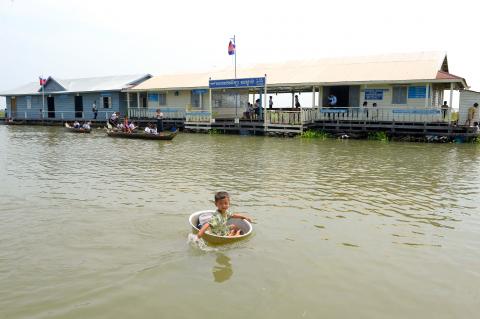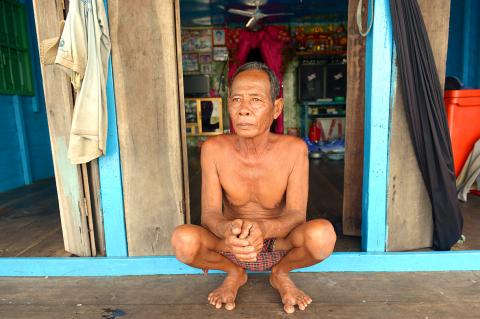Cambodia’s floating villages have adapted to the ebb and flow of Southeast Asia’s largest lake for generations, but modernization and a scarcity of fish are now threatening their traditional way of life.
Houses, schools, hairdressers and even dentists — entire communities bob around on the Tonle Sap, whose waters rise and fall dramatically with the seasons.
The huge lake, nourished by the mighty Mekong river, is home to hundreds of thousands of people eking out a simple — but for many rewarding — existence.

Photo: AFP
“Life in the floating village is much better,” said fisherman Sok Bunlim, who was born and raised in the lake community of Chhnork Trou, where fleets of canoes and small motorboats ferry people around.
The community of fishermen has been living atop the Tonle Sap since the time of their great grandparents, and many older residents cannot imagine any other life.
“If we move onto land, I wouldn’t know how to plant rice. I wouldn’t know how to plough. It is really hard,” Bunlim, 62, told AFP while repairing his broken net.

Photo: AFP
Modern life has not passed them by completely — nowadays many people have stereo systems, televisions and small motorboats.
But they still mostly depend on fishing or rowing around the village in canoes to sell food to earn a living.
The Tonle Sap is a source of sustenance and survival for more than one million people living on or around the lake, which has at least 149 species of fish, the Mekong River Commission (MRC) says.
It transforms between the dry and wet seasons, with the inundated area growing from about 3,500 square kilometers at its smallest to 14,500 square kilometers at the height of the floods, according to the MRC, a regional intergovernmental body.
The lake’s minimum depth rises from about half a meter in April to as much as nine meters in September and October.
So people living on the lake have to be ready go with the flow — quite literally — by allowing their homes to float.
Yet as fish stocks start to disappear, so too are the residents of the lake-top villages.
“I can’t catch enough fish,” said fisherman Yorng Sarath, 25.
“If the wind is calm, I can catch around five kilos of fish a day. When there is strong wind I can only catch around one kilo, and then I have to come back as I can’t lay out my net. I can’t earn enough money to last me all day.”
The father of two said that once he has saved enough money he plans to move to dry land to find work.
LANDWARD BOUND
Life on the lake does move with the tides of time but many modern luxuries are hard to come by, and for young people dry land can hold greater appeal.
Roughly 400 families — a fifth of the population — have left Chhnork Trou over the last couple of years in search of a better life on land, according to community leader Samrith Pheng.
“In the past there were a lot of fish so people wanted to live here. Now the fish stock is going down they can’t depend on the fishing,” Pheng said.
“The young generations such as my children and grandchildren don’t want to live in the floating villages anymore,” he added.
The lake yields about 200,000 to 218,000 tonnes of fish a year —nearly half of the total annual catch of inland fish for the whole of Cambodia, according to a 2006 estimate cited by the MRC.
More recent figures, as well as estimates of how much fish stocks have fallen, are hard to come by and much of the evidence is anecdotal.
Conservationists warn that human population growth, habitat destruction and upstream dams are also threats to the lake’s fisheries and wildlife.
In an attempt to prevent further depletion of stocks, the government in 2012 banned large-scale commercial fishing in the lake in a victory for local communities.
“We are working hard to improve fish stocks,” said Nao Thourk, head of the Cambodian government’s fisheries department, who estimates that about 1.5 million people fish on the Tonle Sap.
But illegal fishing — sometimes using electrocution — remains a major cause for concern.
“If we look at the magnitude of the fishing offences today, we don’t expect fish stocks to increase,” said Om Sovath, executive director of the Fisheries Action Coalition Team (FACT), which promotes sustainable resource management.
The exact number of people living in the floating houses on the lake is unknown, but officials and activists say tens of thousands of families call the bobbing villages home.
Yet beyond fishing or running a shop, job prospects are scarce, and with growing demands for a good education and better opportunities, the traditional way of life could become a thing of the past.
“I can’t say what the future holds for this floating community,” said fisherman Bunlim.

Last week, the the National Immigration Agency (NIA) told the legislature that more than 10,000 naturalized Taiwanese citizens from the People’s Republic of China (PRC) risked having their citizenship revoked if they failed to provide proof that they had renounced their Chinese household registration within the next three months. Renunciation is required under the Act Governing Relations Between the People of the Taiwan Area and the Mainland Area (臺灣地區與大陸地區人民關係條例), as amended in 2004, though it was only a legal requirement after 2000. Prior to that, it had been only an administrative requirement since the Nationality Act (國籍法) was established in

Three big changes have transformed the landscape of Taiwan’s local patronage factions: Increasing Democratic Progressive Party (DPP) involvement, rising new factions and the Chinese Nationalist Party’s (KMT) significantly weakened control. GREEN FACTIONS It is said that “south of the Zhuoshui River (濁水溪), there is no blue-green divide,” meaning that from Yunlin County south there is no difference between KMT and DPP politicians. This is not always true, but there is more than a grain of truth to it. Traditionally, DPP factions are viewed as national entities, with their primary function to secure plum positions in the party and government. This is not unusual

More than 75 years after the publication of Nineteen Eighty-Four, the Orwellian phrase “Big Brother is watching you” has become so familiar to most of the Taiwanese public that even those who haven’t read the novel recognize it. That phrase has now been given a new look by amateur translator Tsiu Ing-sing (周盈成), who recently completed the first full Taiwanese translation of George Orwell’s dystopian classic. Tsiu — who completed the nearly 160,000-word project in his spare time over four years — said his goal was to “prove it possible” that foreign literature could be rendered in Taiwanese. The translation is part of

The other day, a friend decided to playfully name our individual roles within the group: planner, emotional support, and so on. I was the fault-finder — or, as she put it, “the grumpy teenager” — who points out problems, but doesn’t suggest alternatives. She was only kidding around, but she struck at an insecurity I have: that I’m unacceptably, intolerably negative. My first instinct is to stress-test ideas for potential flaws. This critical tendency serves me well professionally, and feels true to who I am. If I don’t enjoy a film, for example, I don’t swallow my opinion. But I sometimes worry